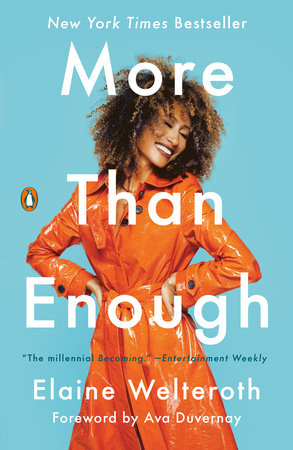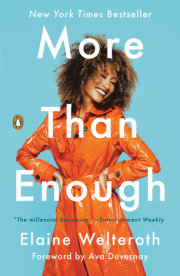Chapter 1
Born Enough
I am my ancestors' wildest dreams.
Brandan Odums, aka Bmike
THANK YOU, JESUS!"
My mother's multi-octave praise assailed everyone within earshot of her hospital bed. She is a gospel singer-a rare female contralto in a traveling church quintet called the Angelic Voices. Those lungs could project.
Her booming voice moved like a praise dance down the long hallways of the Good Samaritan maternity ward, sweeping my aunts, who were anxiously awaiting my arrival, into a kind of contagious joy only she can conjure-we had our very own chorus cheering from the waiting room. I was conceived in love, born into celebration, and it seems almost prophetic now that the first words I'd ever hear were filled with the unmistakable delight of a woman getting exactly what she wanted.
But let's rewind for a second, to the moments before my mother's cry of joy. Shortly after I was born, I was rushed off to the baby ICU with an oxygen-deprived face the color of a Smurf. The umbilical cord strangled me during delivery, so even during those first celebratory moments on planet Earth I appropriately had more pressing matters to tend to than listening to my mother. To this day she jokes that I was busy putting people to work right out of the womb.
Meanwhile, the frenzy around the circumstances of my delivery was so great that it distracted even the doctors from fact-checking one very critical piece of the birth story before reporting it:
"It's a boy!" they proclaimed as I was whisked away.
"Joseph Tyler!" My dad rejoiced, halfway hoping his excitement would distract my mother from the panic of not being able to see or hold her newborn.
My mom will tell you her prayers were simply to give birth for the second time to a healthy baby, but her heart's desire was for a baby girl; a daughter with a gang of hair to braid; a little sister for her firstborn son to protect; a woman to guide throughout her walk in the world. Luckily for her, just as the pigment was returning to my skin and as soon as the doctors could stabilize me, all that baby boy business went out the window-right along with my mom's coy charade. The delivery nurse took a closer look at me and immediately filed a correction.
"Um, excuse me, ma'am. I've been doing this a long time and I know the difference between a girl and a boy when I see it," the nurse said, placing me into my mom's arms. "This is a baby girl."
My mother's life was now complete. She finally had the boy and girl she had always dreamed of.
As a newborn I looked like an exact replica of my older brother, Eric Charles, who was born two and a half years earlier, but Mom was quick to spot one distinguishing characteristic: "You see this jawline?" Her finger traced the only visible bone structure on an otherwise puffy mound of flesh. "She gets that from her mama. This ain't no Joseph Tyler. This is Elaine Marie."
And that's when she let it rip: "THANK YOU, JESUS!"
As any family legend goes, the earliest stories of our lives are passed on like hand-me-downs, stretched in some places and covered in the owner's loving fingerprints. Are they always true? Mostly. Are there some exaggerations? Knowing my mother, no doubt. But regardless of what drama actually went down in that hospital room that day, what I've known for sure every day since is the profound impact of a mother's love. And for as long as I can remember, it has always been there to remind me that I was born enough.
When a girl is born, a universe of possibilities is born within her. When a little Black girl is born, she is born with the promise of a better future; her life represents new hope for breaking generational chains-of systemic oppression, of discrimination, of abuse-that have plagued our lineage. And it is because of the struggles of the strong women who came before that she is born with the potential to dream beyond what any of them ever could.
We are all born with a sense of possibility and limitlessness. This is before the labels are placed upon us, those social stratifications of race, gender, sexuality, and status that start to shape our idea of who we are and that often erode the dreams of what we can become. We are also born with a certain indestructibility that can withstand every one of those tests-if only we recognize it. And it is the power of our own possibilities that keeps us fighting to get back to who we were born to be.
Throughout my childhood, my mom often reminded me that I was born to go further than any woman in our family: in school, in work, in love, in the world. She was certain that I would get to go deeper into my purpose than she was able to in her own life. And she was insistent that I should never settle for anything less. "Because you won't have to," she'd say. "We went through what we went through so that you could live, baby girl. So you gotta live. Run after it. And know that we are all with you. All of us-are all right there with you."
I was born on December 10, 1986, and according to the card I found in my Easter basket one year and taped up onto my bedroom wall, Elaine means "ray of light." Combine that with "world of fire," the translation of my German surname, and you get what my mom describes as a girl with a 'sho 'nuff fire in her belly.
I was two years old when my parents bought our family home in Newark, California, just thirty-five minutes south of San Francisco. It is a very small, middle-class town: one freeway exit on I-880, one mall, one junior high, one high school. Green lawns, four-bedroom ranch-style homes, and a flagpole that kids pledge allegiance to every day in public school. Suburbia, USA. It was the quiet city where my parents were able to afford a home and lay down roots. To me, it was the city where nothing ever happened.
My dad saw Newark as a diverse place to raise us. My mother disagreed on the diversity front, but she always found his optimism to be one of his most redeeming traits. Even with its smattering of first-generation Mexican, Indian, and Asian families, Newark was then and is still a predominantly White town. As an interracial family, we were in the slim minority, though we never felt like an oddity in the Bay Area. Even in our diversity, there was a sameness to all of our lives then. Economically, we were all a part of a similar blue-collar existence in middle-class America. No matter what color kid you were, we all had parents who were just trying to hold on to jobs that promised pensions and the security of a full-term retirement. That was the American dream I came from.
Yet I yearned for the bigness of a life elsewhere. Someplace where people dreamed bigger and walked a little faster. Where houses came with winding, custom staircases and fancier cars. Where men carried briefcases to boardrooms and women wore power suits to work. I didn't know anyone who was even remotely a part of that world back then-but I knew from an early age that was the world I was desperate to live in.
My mom never thought she would wind up on the West Coast. She was born the eldest of three in Macrae, Georgia, a tiny backwoods town where she spent her summers pacing dirt roads with her cousins and mastering the art of soul food in her grandmothersÕ kitchens. She is a self-professed down-home, southern girl at heart—and she has the cooking chops to prove it—but during the school year, she was raised fifteen hundred miles north in Rochester, New York's bustling, blue-collar city life with her two brothers, Tyrone and Tyson.
To pay for their private Catholic school education, my grandfather worked backbreaking shifts driving trucks for Kodak and my grandmother served in the cafeteria at the University of Rochester. My great-grandmother Maggie, who has skin as smooth as butter and is still vibrant today at ninety-eight, was a domestic worker all her life-she was the first generation removed from slavery on my mother's side of the family.
While our people were still being pillaged and suppressed at polls down South, up North my mother was elected class president at Nazareth Academy, a private, all-White, all-girls high school. She grew up in the postsegregation duality of the 1960s and '70s, in a country that promised more for Black people than ever before. She had the privilege of being raised in a two-parent dual-income household, where James Brown's transcendent message of being Black and proud reverberated. Meanwhile, her strict parents instinctively shielded their children from the racism they still faced daily-even in integrated working-class neighborhoods in New York.
Young Debra Elaine Southerland (never call her Debby—trust me) was a sheltered, overachieving student with a smiley, preternaturally joyful disposition. Genetically blessed with high cheekbones, a megawatt smile, and a naturally slim, tall frame, she was the kind of woman you might hate if she wasn't so damn sweet. Her plan was to attend the University of Rochester; marry her high school sweetheart, John; have a couple of Black babies; maybe become a teacher; and live happily ever after, close to family on the East Coast.
But you know what they say about God and plans—we make 'em, God laughs.
Life managed to get in the way of my mom's girlhood dreams coming true. At the age of eighteen, after a family dispute she was shipped off to San Jose, California, alone, where she struggled to start over. The painful details of that journey are hers to share, but my mother's story isn't one of victimhood; she managed to do more than just survive the blows life dealt her-she was always determined to thrive.
She got a job bagging groceries, then became a temp receptionist at San Jose State University, and by twenty she landed a gig as a temp typist at a Fortune 500 aerospace corporation. On her first day of work an older White man escorted her to her desk, leading her through workstations where lewd pictures of nude women hung in plain sight. The year was 1979, and she was a single, young Black woman with no family and no friends in a new city, entering into a male-dominated industry of engineers who swore like sailors and ogled titty magazines at their desk. Even so, my mother felt entitled to her dignity. With more to lose than anyone, she turned to look into the eyes of a man who seemed utterly oblivious to the assault on her morning routine, and said plainly:
"If I have to come into this room every day to do my job, can you please take down those images?"
The man laughed nervously, taken aback by the audacity of her request, but the images were gone the next day.
Word got around that my mom was the "snitch" who made the men clean up their act around the office, but the OG office matriarch warmed up to her right away. Mary Patricia Welteroth was a little old Irish lady with big blue eyes, and in a pod of lily-white typists, she was the queen of the roost. Over daily lunch dates, she taught my mom everything she knew about life, love, family, and putting men in their place. One day at Frankie, Johnnie and Luigi's pizzeria in Mountain View, she said:
"Well, you know, Deb, you really should consider dating my son Jackie."
My mom told Pat she loved her to pieces but that she wasn't having any of it: "Patty, my life is hard enough," she retorted. "Ain't no way I am gonna make it harder by going out with a White man. No, ma'am."
"Oh, now, Debra, what does any of that matter?" Pat responded, as if race were just a bump in the road you could simply sidestep in a relationship.
Clearly, my grandma Pat was way ahead of her time. Or perhaps just as naive as her son.
Patricia Welteroth was an avid reader who studied social justice and literature at University of California, Berkeley. She was head of the debate team and the pep club. Which is just to say you couldnÕt win an argument with this charismatic, pint-sized woman if you tried. She married her college sweetheart, a stoic, second-generation German American boy named Chuck, who wrote her romantic letters after serving as an Air Force lieutenant in World War II. He worked as an executive at the same aerospace company where she was a typist. Together, they raised a family of four kids in a liberal, Irish Catholic household.
Their youngest son, Jack, was then a thirtysomething-year-old blue-eyed boy; a carpenter at the same company his parents held office jobs. According to my mother, he spent his workdays "looking like a dustbowl." He lived in a bachelor pad in the foothills of Cupertino with two cats, Lumpy and Blondie, and an acoustic Gibson Gospel guitar named Maple. To let him tell it, he's always had "soul," for a White guy from Saratoga. Growing up in the 1950s in a scenic town in Northern California with beautiful, rolling hills and sprawling orchards that go on for miles, Black people were merely figments of his musical imagination. He claims as a kid he was the only one in his whole milk-white neighborhood racing home after his paper route to listen to B. B. King and Dionne Warwick records.
Over long lunches with chatty Patty, my mom came to know every intimate detail of Jack's and his siblings' lives. When tragedy struck the Welteroth family with the sudden passing of the eldest son, Bobby, my mom sang at his funeral. Afterward she showed up on Jack's doorstep with a home-cooked meal—a gesture she still offers anyone in crisis. She knew from Pat that Bobby was not only Jack's brother, he was his bandmate and his very best friend.
That day my mom and dad formed a friendship, rooted in vulnerability and honesty, and eventually he even found his way into her heart. It was a relationship they both say was beyond skin deep right from the start—and it had to be in order to sustain the inevitable blows of any lifelong, interracial love affair.
Decades later, at my mom's fiftieth birthday party, there wasn't a dry eye in the room when my dad described seeing my mom sing at his brother's funeral: "The way the light from the church's stained—glass window shined on her—it was just like an angel came down to remind me that there was a God in a godless moment in my life." He ended the tribute holding up a glass of water, barely making out the words: "She's the best thing that ever happened to me."
Copyright © 2019 by Elaine Welteroth. All rights reserved. No part of this excerpt may be reproduced or reprinted without permission in writing from the publisher.










